Parables Of The Bible
Lesson 4.16
The Kingdom parables of the Bible conclude with these two stories that accentuate God's inexplicable forgiveness and abounding grace to those who love him.
Please read Matthew 18:21-35 ESV before beginning free Bible study lessons, #4.16.
Previous Lesson: Wheat And Tares #4.15.
Preliminary Bible Study Questions:
1. How many times does Jesus tell you to forgive a person?
2. What did the unmerciful servant first request, and how did the king respond?
3. What is a denar?
There are around 40 parables in the Bible but unfortunately I don't have the space to teach all of them. I've included a couple important Kingdom parables in this lesson to close out the Parables of Jesus series.
The parable of the unforgiving servant will be first, and the parable of the workers will conclude the study. Let's get started.
Parable Of The Unmerciful Servant Setting
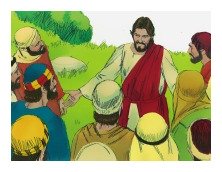
This parables of the Bible lesson starts off with the parable of the unmerciful servant (aka the unforgiving servant). Jesus spoke the parable in response to Peter's question, "Lord, how often should I forgive someone who sins against me? Seven times?"
Jesus responded with a hyperbolic parable that demands attention to the importance of displaying mercy, grace, and forgiveness.
God leads the way in showing the follower of Christ how to show mercy through forgiveness.
Parable Of The Unforgiving Servant Symbolism
The parables of the Bible many times use regal characters, and also characters who operate on the extremes of life, to portray spiritual truths. The parable of the unmerciful servant is no different.
The king here represents the true King of kings, Jesus Christ. The servant who stands before him represents a person who presumes upon both forgiveness and salvation.
The monetary debt symbolizes a person's sins against God. The second servant is the first servant's victim, being the unfortunate soul who absorbs his godless, merciless wrath.
The second servant's debt symbolizes a sin against the first servant.
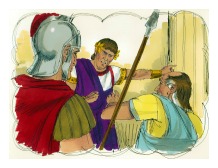
The fellow servants are children of the
King who watched this hypocrisy and wicked activity take place. This act
was a terrible offense for them to behold.
Jesus' parables of
the Bible illustrate his prior teachings. The parable of the unmerciful
servant definitely gives us a graphic picture of his Lord's prayer in
Matthew 6:12-15, "And forgive us our sins, as we have forgiven those
who sin against us...If you forgive those who sin against you, your
heavenly Father will forgive you. But, if you refuse to forgive others,
your Father will not forgive your sins."
Of the sum total of the parables of Jesus, in terms of Christian conduct within God's Kingdom this one ranks highly, being next to the parable of the good Samaritan.
Forgiveness of others is no small matter.
Parable Of The Unforgiving Servant
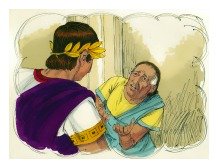
This parables of the Bible lesson will now discuss the story of the unforgiving servant. A king was presiding over delinquent repayment cases one day when one of his servants was brought before him.
This servant owed an incalculable debt, i.e. millions of dollars, to the kingdom of the king. The servant, of course, couldn't pay the huge debt, nor would he ever be able to repay.
As was custom for their era, the king ordered that the servant, along with his wife and children, be sold to satisfy the tremendous debt.
The servant threw himself down on the floor, bowing before the king. He pleaded with him for more time in order to pay the debt. The king saw the passion within this servant to repay the debt and save his family from the pain of separation and slave labor.

The king showed pity and had great compassion on this servant.
He gave this servant more than the servant requested, much more. The servant requested more time, i.e. the king's patience; but, the king forgave this man's entire debt. You read that right. The
king removed the entire incalculable debt that this man owed the
kingdom. Grace and mercy abounded on this day in the courtroom of the
king.
Immediately after leaving the king the servant hunted
down a fellow servant who owed him a small amount of money. His fellow
servant agreed to pay but he needed some time to save the money.
The first servant grabbed him by his throat and demanded the money NOW. The second servant fell to his knees and pleaded for more time.
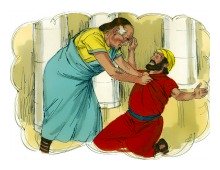
The first servant didn't grant him the time, and had him arrested and thrown in prison until he could repay the small debt. Their fellow servants watched this in horror. They rushed to the king as witnesses to this wicked, unjust act.
The king could not believe what had transpired and called for the first servant to return.
The king lambasted the servant, "You wicked servant! I forgave you the tremendous debt because you pleaded with me. Shouldn't you likewise have mercy on your fellow servant?!"
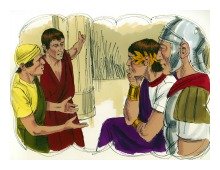
Parable Of The Unmerciful Servant Meaning
The parables of the Bible always contain a bold message from Christ and this one is particularly strong. Jesus, the King, forgives those who forgive others.
Let's look inside our hearts for a moment. We all have accumulated an incalculable amount of sin against God. Your sin, my sin, everyone's sins daily continue to pile up into a stench-filled mountain of sin against God.
There is NO WAY any one person can repay God for his or her own massive sin debt (Romans 3:23).
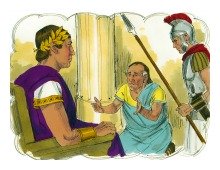
Forgiveness is available, though, to those with a heart full of forgiveness for others.
Forgiving others is not a prerequisite for our own forgiveness, but a heart willing to forgive others is a sure sign of true forgiveness.
Bitterness that takes root within one's heart against past sins of others is a bad sign for one who purportedly follows Jesus Christ. How does your heart stand up to this incredible test? Do you still have some bitter skeletons of vengeance hanging in the cold, dark closets of your heart?
A person who doesn't grasp God's complete and eternal forgiveness may not be able to understand and apply this awesome parable of the unmerciful servant lesson.
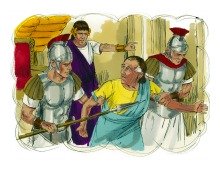
This teaching from Hebrews 12:14-15 directly applies to this parable of the Bible, "Work at living in peace with everyone, and work at living a holy life, for those who are not holy will not see the Lord. Look after each other so that none of you fails to receive the grace of God. Watch out that no poisonous root of bitterness grows up to trouble you, corrupting many."
Please, please forgive those who have sinned against you, even seventy times seven times. You have no right to presume upon God's forgiveness and salvation if you're unable or unwilling to follow his lead example.
If you're a bitter soul, expect Jesus to do to you as he did to the first servant, because he will do what he says he'll do (Matthew 18:35).
Parable Of The Workers
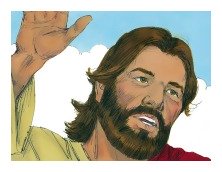
Our study of the Kingdom parables of the Bible will now conclude with a striking look at God's astounding grace. Please read Matthew 20:1-16. This massive topic deserves its own lesson, I know!
There will be more studies in the future to delve further into God's glorious grace. The parable of the workers in the vineyard was told to Jesus' disciples immediately prior to his passion week. It obviously has the amazing grace that built God's Kingdom in mind.
Jesus' parable of the workers represents God by the landowner, and his chosen ones are represented by the workers. The vineyard symbolizes a Christian's work in the world, and the payment represents the ultimate gifts, rewards, and glory of heaven.
The parable of the workers is meant to change our thinking about "pay for performance" within the Kingdom of God.
Parable Of The Workers Meaning
The parable of the workers begins with a rich landowner who recruits some workers for his vineyard early one morning. They agreed on a price of one denar for the day's wages. A denar was a Roman silver coin that was worth about a day's wages.
A little while later, the landowner recruited a few more workers who were hanging out in the marketplace doing nothing. He told them he would pay them a fair wage.
At noon the landowner found some more workers, and three in the afternoon he found still more workers. He told them all he would pay them a fair wage at six in the evening. Believe it or not, the vineyard owner was in town and saw some more workers who were doing nothing. He asked why they were standing idle at five o'clock in the afternoon. They simply told him that no one hired them for the day. The landowner told them to join the others in the vineyard, and he would pay them a fair wage.
The work day came to a close and the workers lined up for their wages in order from last to first. The workers who came at five o'clock each received a denar for one hour of work. The workers who arrived at three each received a denar for three hours of work. The workers who arrived at noon each received a denar for six hours of work. Those who arrived at nine in the morning each received a denar for nine hours of work. Finally, those who arrived in the early morning hours each received a denar for an entire day's work.
The workers who arrived in the morning were sure that the landowner would pay them more for working all day long in the scorching heat. They protested the wages, wanting more than was agreed upon.
The landowner immediately shot back, "Friend, I have not been unfair! I paid you exactly what we agreed upon, and if I want to pay other workers the same I will indeed pay them the same. I did not break any laws. Why are you envious when I am being kind to these workers who started the day in the afternoon? Now take your money and go."
The parables of the Bible demonstrate that the Kingdom of heaven is much different than this earthly life we live. We expect to get paid for the amount of time we work comparative to others.
Naturally, in church life, we would also think that the saints who were saved young, and served God their entire lives, would get greater rewards in heaven than those who were saved late in life.
The parable of the workers reveals that the thief on the cross will receive as much glory and honor as John the Baptist (Luke 7:28). No envy will be allowed in heaven and Jesus is wanting us to understand this truth.
God's kind grace reaches people at different times and in different ways, but this much is true - NONE of us deserve anything but eternal death.
Please understand this lesson of grace and apply it to your thinking. We are to fight for souls until the day we die, rejoicing along the way every time a soul is saved by God.
Love God, and love the souls of people, at all costs.
The Kingdom of God enlists workers, and their ultimate goal is the harvest, not the wages received for the work performed. Remove yourself from that worldly mindset.
The old, long-time saint will receive the same amazing grace as the rough, tough sinner man who received Jesus Christ on his deathbed. Glory to God.
Grasp This!
The parables of the Bible are great for revealing the heart of Jesus and those things which are important to him. He loves us so much and he wants the best for everyone. Jesus knows the future and how wonderful it will be for those who are gifted with God's grace.
Jesus' passion is the condition of people's souls and their eternal destination. God saves by his grace, not by your worthiness. Grasp it.
Jesus' parables of the Bible, specifically today, the parable of the unmerciful servant and the parable of the workers, speak of unexplainable forgiveness and immense grace that flow through the living waters from heaven.
There can't be unforgiveness in our own hearts, nor can there be envy in our eyes. Christians who harbor these awful sins, and worse, display them, are in danger of being exposed as Christian hypocrites on Judgement Day.
Mercy! Listen to the King, understand God's forgiveness and grace, and pour out the same to other people. Anything short of that is utter selfishness, a grievous sin in and of itself.
God's best to you in your fight against these sins. Demonstrate love, mercy, grace, and forgiveness to everyone you know.
Next Lesson: The True Vine #4.17.
Bible Parbles Study Questions:
1. Do we have to forgive everyone in our past and future before entering God's Kingdom through salvation's doors?
2. The parables of the Bible stretch our minds, and the parable of the workers does this in a bold manner. Don't you agree with the early morning workers that they should have received more compensation? Why or why not?
3. What is the ultimate goal for all Christian workers? How does this answer alter your previous thinking?
Inspirational Bible Verses:
Brothers, my heart's desire and prayer to God for the Israelites is that they may be saved. For I can testify about them that they are zealous for God, but their zeal is not based on knowledge. Since they did not know the righteousness that comes from God and sought to establish their own, they did not submit to God's righteousness. Christ is the end of the law so that there may be righteousness for everyone who believes. Romans 10:1-4
Get rid of all bitterness, rage and anger, brawling and slander, along with every form of malice. Be kind and compassionate to one another, forgiving each other, just as in Christ God forgave you. Ephesians 4:31-32
Prayers Of Thanksgiving:
Dear Father, the parables of the Bible teach us so much about you and your wonderful Kingdom. Thank you for instructing us so that we can help others understand the glory that awaits. The workers for the harvest are few, Lord, the Bible tells us that fact; so, please use us to proclaim your word to the world. Thank you, Lord, for your perfect forgiveness and help me to truly forgive all others who have wronged me. Thank you for the grace that abounds on my life - it is really amazing. Glory be to God in the highest. In Christ's name. Amen.
After sharing this Bible study lesson on Facebook or Twitter below download your Free Printable Bible Study Lessons: Parables Of The Bible #4.16. Please Donate To GG.com!
Return to Parables Of Jesus page. Return to GraspingGod.com's Homepage.
Special Note: I'm grateful to Big Book Media & Free Bible Images, Stock Exchange, Morgue Files, and Stock Photos For Free for the use of their photos for Parables of the Bible.
